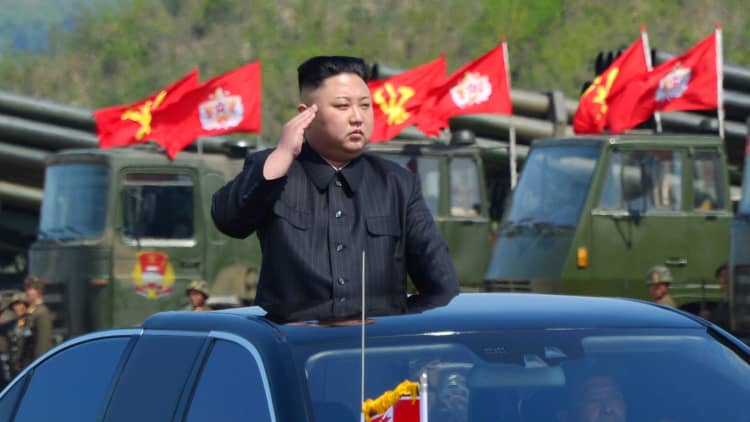When a brutal, communist dictatorship is able to attract tourists, the most obvious question is: Who?
North Korea was isolated further Friday as the United States that it will ban its citizens from visiting the country. Given the worrying headlines that consistently swirl around the Democratic People's Republic of Korea, common sense suggests that you'd be hard pressed to find a vacationer willing to take a trip there. But international tourists do visit — and in the thousands.
Tourists range in age from students to the retired, Simon Cockerell, Beijing-based general manager of Koryo Tours, one of the largest international operators of trips to North Korea, told CNBC via telephone. Cockerell detailed that it was "very common to have people booking alone."
Lupine Travel, a British company that offers trips to North Korea, told CNBC via e-mail that roughly 75 percent of its clientele are male.
For Koryo Tours, U.S. and U.K. nationals each make up 20 percent of its customer base. The rest comprises of travelers from northern and western Europe, as well as Australians, Canadians and those from Middle Eastern countries including Israel, Saudi Arabia and the United Arab Emirates.
The non-Chinese tourist market is currently 4,000-4,500 per year, down from a high of 6,000 in 2012, according to Cockerell.

But Chinese ultimately make up the lion's share of North Korea's tourists — 95 percent, Cockerell said. He added that most commonly, this comprises of less wealthy Chinese crossing the border for a day trip, often seeking nostalgia for China's own, pre-industrialized past.
The U.S. announced Friday that it would implement a Geographical Travel Restriction on U.S. nationals traveling to the country. According to State Department spokesperson Heather Nauert, in a statement seen by CNBC, this was "Due to mounting concerns over serious risk of arrest and long-term detention" of U.S. citizens. A notice will be published in the Federal Register this week, with the restriction going into place 30 days afteward.
As yet, no other countries have announced similar measures. According to Reuters, North Korea is the only country in the world U.S. citizens cannot visit.
"If the U.S. government says Americans cannot come to this country, we don't care a bit," senior North Korean official Han Chol-Su told Agence France-Presse Tuesday.
Why the US made the ban
Two experts who spoke to CNBC said the U.S. measure was a response to American student Otto Warmbier's recent death following a visit to North Korea. In March 2016, Warmbier was sentenced to 15 years hard labor after allegedly trying to steal a political slogan from a hotel. He was released in June this year and returned to the U.S. in a coma, dying that month.
Tensions in the Korean peninsula have amped up recently, with North Korean dictator Kim Jong Un continuing to test nuclear weapons — thought to be capable of reaching U.S. soil – despite United Nations sanctions.
Koryo Tours said that military tension does not deter tourists, though the Otto Warmbier case had caused U.S. visitor numbers to drop off. Dylan Harris, director of Lupine Travel, added that amped up media coverage of North Korea during times of tension brings about more interest in the country, which results in extra bookings that negate any cancellations from more wary travelers.
There is no U.S. consulate or embassy in North Korea, but limited services are provided to U.S. citizens through the Embassy of Sweden.
North Korea does promote itself as a tourist destination. Its DPR Korea Tourism website suggests that as well as visiting the capital Pyongyang, tourists can also ski and surf in the country.
Isaac Stone Fish, senior fellow at the Asia Society's Center on U.S.-China Relations, told CNBC via e-mail that the U.S. travel ban "comes as the Trump administration is looking for other ways to punish Pyongyang for the death of Warmbier and North Korea's frequent missile tests throughout 2017."
Stone Fish, who has visited the country twice on organized tours, added that "Visiting North Korea is a rare opportunity for Americans to humanize North Koreans," beyond the national stereotype of a "cartoonishly evil leader, nuclear weapons, and rows upon rows of goosestepping soldiers."
Jonathan Pollack, senior fellow at the Center for East Asia Policy at the Brookings Institution, said that: "This decision is both appropriate and overdue."
"It's about protecting American lives ... I see extremely limited prospects under prevailing circumstances for any meaningful improvement in US-(North Korea) relations," he added.

